Most people who visit Koh Samui fall for its charm. I certainly did, so much so that I moved to the island and lived there for over a year.
Some argue that due to development Samui has lost the island authenticity it had 20-30 years ago. But that's life…nothing remains the same. And for those discovering the island for the first time today, their experience is no doubt akin to mine all those years ago.
Yes Samui (เกาะสมุย) now has malls, yes it has lots of luxury hotels and condominiums, but it also has an abundance of natural beauty: fantastic beaches, beautiful ocean views, lots of local markets and community activities, and a perpetual air of freedom about the place that has never left my thoughts.
The thing is, spending a holiday somewhere is very different to living there full time; though I'd caveat that statement by saying that I always partly felt like was on holiday in Samui. I think living by the beach has that effect on you.
But yes, living there means doing your own shopping, getting your laundry done, staying home a lot during rainy season, budgeting expenses, etc., and, as with living anywhere in the world, there will be good and bad days.
Before we look at specific areas, let's jump into some considerations when planning your move.
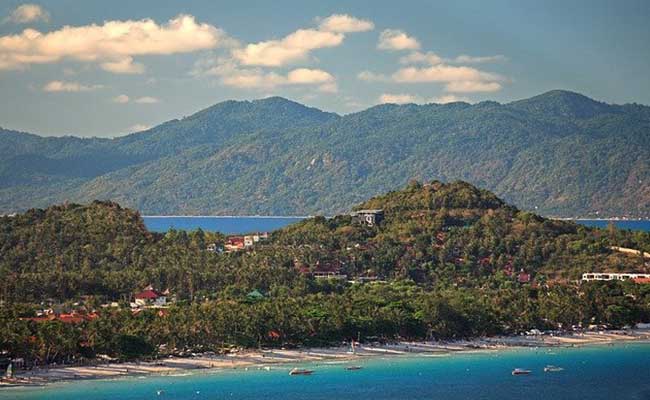
Samui from afar.
Living on Koh Samui: Initial Considerations:
Whether you've visited once or twice, or you're considering a relocation, here's a few important things to think about as you start your research:
1. Location
When you're on holiday you're out every night in bars, restaurants, clubs, etc., so it makes sense to stay in a hotel that's close to the action, in this case Chaweng, the island's main town.
Most expats, however, choose to stay outside of Chaweng, away from the tourist strip.
The primary reason for this is to have the option of getting away from the touristy vibe. There will be nights where you don't want to go out of an evening, and days when you just don't want to be part of the tourist trap.
This will be your home. You don't want to hear boozed up holiday makers and loud motorbike exhaust pipes outside your window at 2am every night as they return from Sweet Soul (a club on the Green Mango).
Moreover, living in a party zone kinda takes the novelty out of partying. I found that living a few km away made going out for a night in Chaweng a little more special than having it right on my doorstep. The whole ride down to the town was part of the ritual.
Furthermore, living closer to the center, where the main beach and nightlife is, will mean higher rental costs – certainly for more modern condos.
That being said, perhaps you don't like riding a moped and won't have a car. So if you're on foot or prefer a bicycle, you will want to choose an area that is walkable to a beach, to the shops, and to some restaurants and bars.
You can always get a taxi into Chaweng or Lamai if you need to, though it's a fixed rate on the islands (no meters), which does add up to be quite an expense if taking taxis on a regular basis.
2. Shops
While you don't want to be right on top of a tourist hotspot, you don't want to too far away from a supermarket or large store.
Fortunately, on Koh Samui you're never more than a km from a 7-Eleven, so running out of everyday household goods won't be a problem.
The island has plenty of supermarket options, including Big C, Tesco Lotus (more than one), Topps, and a Makro.
3. Schools
If you have kids, then they will need an education. Expats who have Thai children (mixed or full) will have access to the Thai education system, but if you can afford it you will want to educate privately.
Samui has a a fair choice of international / bilingual schools. Here's a few for you:
- Samui Tiny Steps Nursery & Preschool in Bophut
- The International School of Samui (ISS) – in Chaweng
- Lamai International School
- Panyadee British International School – in Chaweng Noi
- Oonrak Bilingual School – in Mae Nam
Expect to pay upwards of £1,000 per term.
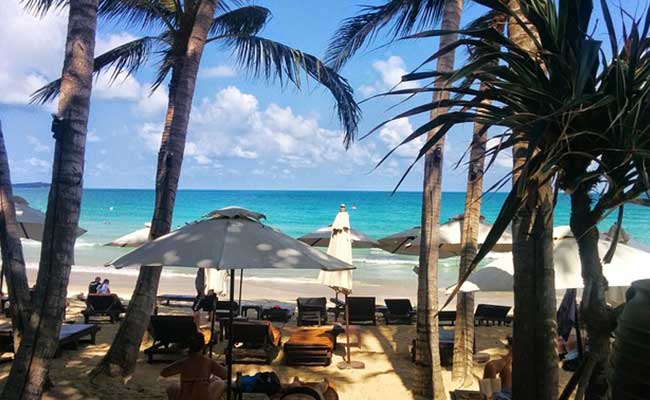
Living the good life on Chaweng Beach
4. Hospitals
Koh Samui has 4 main international hospitals. so wherever you stay you won't be too far from a hospital offering a good standard of care.
- Bangkok Hospital (on the ring-road in Chaweng, before Chaweng Noi)
- Bandon Hospital (near Big C Shopping Centre)
- Samui International Hospital (northern end of Chaweng Beach Road)
- Thai International Hospital (Opposite Tesco Lotus, Chaweng)
Most people arrive to Thailand with travel insurance that covers them for a limited period only.
Please consider that you'll need health insurance if you plan on living in Thailand long term. While cheaper than the West, International hospital bills can be high if you need specialist in-patient treatment.
You can get international health insurance that will cover you in Thailand, back home and in other countries.
Or you can get a domestic insurance that will cover you in Thailand.
5. Road Quality & Driving
Despite a lot of development in the past two decades there are still a lot of awkward roads that aren't pleasant to navigate on a moped, which is what most people get about on.
So when viewing accommodation consider your route home from town and how easy it will be during the rainy season and in the dark. Some roads are more prone to flooding than others, and some can be a little dodgy to ride on late at night after a couple of tins.
I'll take this opportunity to remind you that you do get some crazy drivers on Thai roads. Always wear a helmet and ride your moped cautiously.
If you have the budget and are staying long term, hiring or buying a car is a good investment. You are less likely to be seriously injured in a car vs a moped.
6. Crime on Koh Samui
I'm quite sure the majority of crime in Samui goes unnoticed by foreign nationals. That certainly was the case for me.
I've heard stories of crime related to feuds between families, drug dealing and corruption, but it didn't affect my life.
However, national statistics suggest bribery and corruption on Koh Samui is high.
The good news is that violent crimes such as assault and armed robbery are listed as low risk. And crime overall is considered low.
In my experience, the crime in Koh Samui is tends to be opportunistic.
For example, a drunk friend of mine had his chain stolen by a ladyboy in Chaweng on a night out. Don't ask!
And when living in a ground floor condo, someone forced the sliding back doors open and stole my camera off the table. The lock was weak as hell and to be honest I should have noticed this flaw when I moved in.
To be honest, I think the thief was someone I'd had in my apartment at some point. Again, don't ask!
The only other incident I remember was a foreign couple who'd just arrived on a boat from the mainland. They gave their bags over to be stashed in the hold on the boat. When they got off the boat and looked for their cash, they realized that all their holiday money had been stolen.
They were sitting down crying on the steps of my friend's travel agents. They had saved for years for the trip and naively given the back with the money in it to a boat hand and he'd nicked it.
It was heartbreaking.
Koh Samui attracts near on 3 million tourists a year. By nature of the beast you are going to get thieves taking their chances. So just be sensible and keep your wits about you.
With these few things in mind, let's have a look at your main choice of areas to live in.
Popular Expat Areas on Koh Samui
1. Bophut
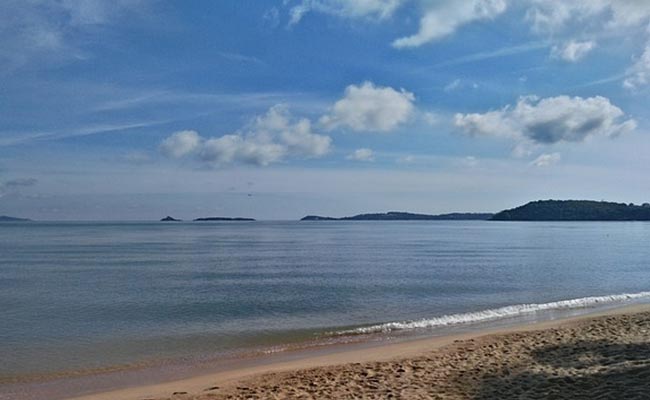
Bophut Beach
Bophut is a great area to live as an expat. You have the best of both worlds in that the majority of Bophut is fairly quiet but there's also plenty of dining and bar options.
The Bophut beachfront is smaller than Chaweng and has two piers along the stretch where tour boats leave and dock from. This makes the beach area in Bangrak okay for chilling but not as desirable for swimming.
However, if you follow the coastal road from Bang Rak down towards Fisherman's Village, there are a number of secluded beach spots on the way, and the beach is better down near the village itself.
Fisherman's Village is a traditional waterfront area lined with wooden houses converted into restaurants and shops. It's a lovely spot for an evening meal or a daytime fruit shake and chill.
The famous Big Buddha Temple also lies within the Bophut boundary. The temple has delightful views across the ocean and, even as a non-tourist, I still used to go there sometimes just to contemplate awhile.
It's easy to get into Chaweng (the main town) from Bophut. It takes around 5-10 minutes on a moped, depending on the way you go (you'll quickly learn the shortcuts).
For food shopping, you have the option of Tesco Lotus or Big C.
There's a good range of accommodation in Bophut, too. You can rent condos, houses or villas, ranging from cheap and cheerful to very luxurious.
Bangrak, in Bophut, was where I lived and I very much enjoyed my time there.
2. Choeng Mon
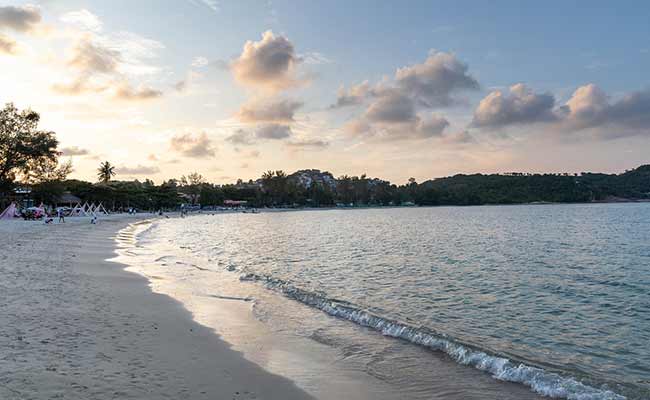
Choeng Mon Beach in the early evening
Choeng Mon is pretty quiet, though not as quiet now as I remember it 14 years ago.
I remember being one of just handful of visitors to Choeng Mon Beach on an average day. Sometimes a few of us would go down there and have the place to ourselves.
We'd spend a couple of hours swimming and then stop and chat with the massage ladies on the beach – and get a massage of course!
Since then more hotels have sprung up, aimed largely at tour groups, and a building spree has seen the development of affordable condos that cater to the expat community.
I had a couple of friends living in Ban Plai Laem in Cheong Mon in very affordable one bedroom bungalow-type houses, which will suit those on a lower budget.
Choeng Mon is well located, in that it's a half way point between Bophut beach and Chaweng Beach. There's not much there, but it's a good location with great views from the bay.
3. Chaweng
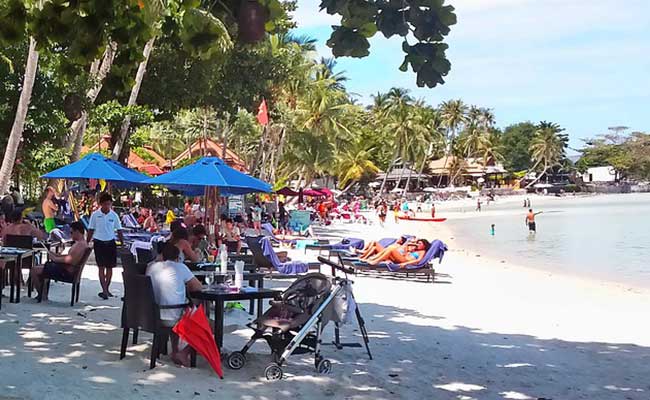
Chaweng Beach
Chaweng is the main town and has the biggest beach. Parts of the beach are to die for, and in some places at low tide you can walk a long way out along the golden sand.
It has it all: the daytime beach life, with water-sports, music, massage and and plenty of cold beer to boot, and at night there are restaurants and bars everywhere.
And then there's the Green Mango strip, housing a number of bars and clubs, including one of the same name. There's a a few go-gos, too, if that's your thing.
A little moped ride away is Soi Raggae, which is home to the infamous Reggae Pub.
The open-backed club over looks the lake and is where everyone tends to turn up pickled late on in the night. Besides bad dancing and lots of flirting, you'll find pool tables, a snack bar and big screens showing live sports.
If you'd prefer a quiet(er) drink of an evening, there's always Ark Bar, a beach front chill out bar that attracts both Thai and foreign customers who want to take in the moonlight bouncing off the shoreline. You can also noodle around the shops for souvenirs and the usual holiday strip tat.
For me, Chaweng will always represent crazy nights out that start off with an intention to go home at a reasonable time :). For a more reserved night out, consider Lamai.
4. Lamai
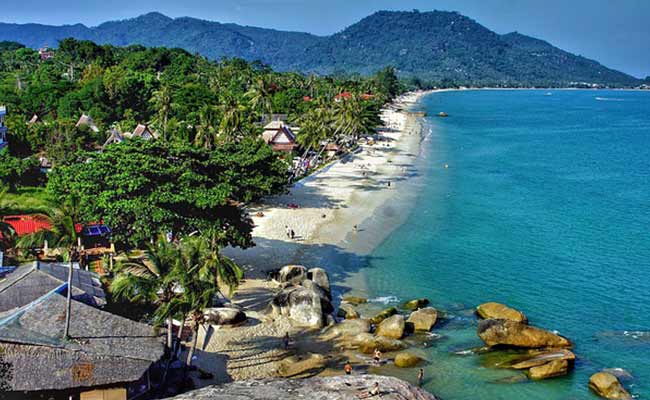
Lamai Beach
Lamai is Koh Samui's second-largest resort area. Located on the east coast between Taling Ngam and Chaweng, Lamai has a laid back village feel and attracts a more mature crowd.
In past times Lamai was considered a cheaper option to Chaweng, but the area has seen an upgrade in recent years, with new resorts such as The Pavillion and The Renaissance offering luxury accommodation.
Living in Lamai is easy. There's plenty of accommodation to suit varying budgets and lots of restaurants and local shopping options, including Tesco Lotus and Makro. You'll also find health spas and massages aplenty.
The beach is comparable to Chaweng, but wider and with boulders dotted here and there. I have found the water to be a little choppier than Chaweng at times, but the waves can be fun.
One thing I love about Lamai is the various viewpoints along the coastal road. Many a time I have stopped off on my moped and just taken in the views for a while. Be careful riding that road, though. Go slow!
One thing to consider about Lamai is that it's a solid 15 minutes ride into Chaweng, but often seems longer. It's not a journey I like doing late at night. And that's why I never wanted to live there: because my friends and lifestyle at the time was based around Chaweng (the gym, the clubs, etc).
5. Maenam
Somewhat of a backwater village, Maenam Beach sits to the left of Bophut Beach, about a 10 minute ride away.
I don't have a huge amount of experience with Maenam, but a close friend owned a restaurant there for a while, so I know the vibe.
It's cheaper to live there than the other places on this list, and that's why many expats end up there. But it's also much quieter and lacks the tourist foot traffic of Chaweng, Lamai, and even Bophut.
The beach is lovely but has slightly coarser sand than other notable spots on the island. It's usually not very busy, either.
The nightlife in Maenam is unimpressive but adequate. There's no entertainment into the small hours. Nope, this is a place for those who want to avoid the crowds and enjoy their own company after the sun goes down.
Where Should You Live in Koh Samui?
While the above information might be useful as a guide to get started, no blog post or collection of photos can give you the “Samui experience”.
You need to put boots on the ground and feel the place out for yourself.
I've said this before and I'll say it again: Give yourself time to acclimatize. Rent a place for a month and take your time to explore the island. Perhaps rent a month at a time in a few different areas before making a decision on where you want to stay in the medium term.
Give the honeymoon period time to wear off before making any long-term decisions, and certainly don't rush in and buy a condo or villa.
For most people, arriving on a tropical island from a boring city is like arriving in heaven: the sun, the coconut trees, the beach, the women, the smiles, the food, the nights out, the list goes on.
It's easy to get taken in by it all and declare your unbreakable love for paradise in the sun. But all love affairs have their ups and downs, and the more intense the first few months the more volatile things tend to become later down the line.
So don't rush in. Rent everything and enjoy the ride for a while.
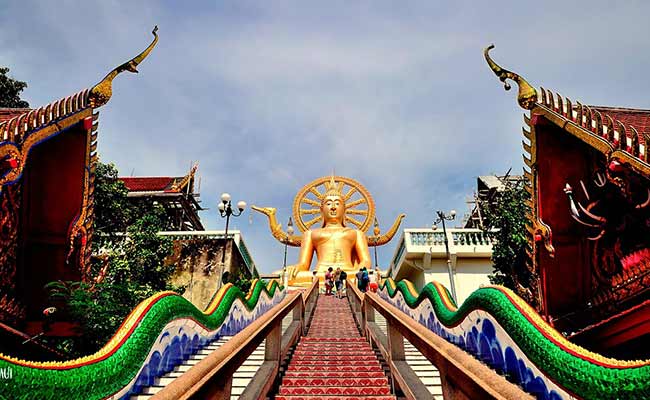
The Big Buddha temple in Koh Samui
Why I Left Koh Samui
If Koh Samui is so wonderful, then why did I leave?
I left the island (mainly) because I hadn't seen enough of the rest of Thailand to know where I wanted to settle. I mean, back then I was still pretty young and I knew there was more to my Thailand adventure to follow.
Many of the people I had met in the early days of my time there had left, either gone back home or landed a new job elsewhere in Thailand.
Things had stagnated a bit and I felt that the island had become a bit too familiar. I'd see the same faces in the gym, on the beach, in the bars, etc.
Don't get me wrong, there's nothing bad about familiar faces and feeling part of the community, but at that point I wasn't ready to commit long term.
Bear in mind that I was seeing travelers arriving and then leaving to explore all these wonderful places that I hadn't. I kind of felt that I would miss out if I didn't make a move.
So I went to Bangkok. From there I explored areas of the north like Chiang Mai and Pai, and took trips to Laos, Vietnam, Cambodia, etc.
I met my now wife in Bangkok and she wasn't keen on living on an island, so I never went back to Samui to live.
Visiting Again 3 Years Later…
I did go back for a holiday with a friend. I remember we stayed in Chaweng at the Garden Resort; but it just wasn't the same vibe. While I enjoyed the beach and being by the sea, the nightlife somewhat lost its appeal.
Perhaps it was part age or the fact that nothing is ever as good the second time around. In hindsight, I think it was because, having lived there and once felt like it was my home, being a tourist staying in Chaweng just felt strange.
When I landed on Samui to live it was a new beginning, an escape from the mundane and ghosts of the past and a new life of freedom and opportunity in the unknown. I turned 30 there, met many different people from all walks of life, and had so many great experiences.
I guess you might say it was a place I lost myself for a while and then re-found myself and moved on.
Happiness is when favorable circumstances and positive feelings collide, and nothing will beat those 18 months I spent there.
I do have plans to go back with my kids though. My wife has never been either, so she's keen to visit.
Would I Go Back to Live in Samui Now?
I think about this sometimes….and part of me wishes I hadn't left. There's something about that island that stays with you. But much of it is nostalgia and a want to relive that part of my life.
I'm older now, I have kids and life is a little more complicated, one might say. Who knows, though, perhaps I'll retire there…
For you, though, as someone considering a move there, I'd do it in a heartbeat.
More Tips for a Better Life in Samui
Improve Your Thai Skills:
Learning Thai makes life here easier and more fun. I use Thaipod101. It is free to get started.
Get Medical Insurance:
For full international cover get a quote here.
Read More On Koh Samui:
Here are 15 things you can do on the island - 10 are free!
Last Updated on
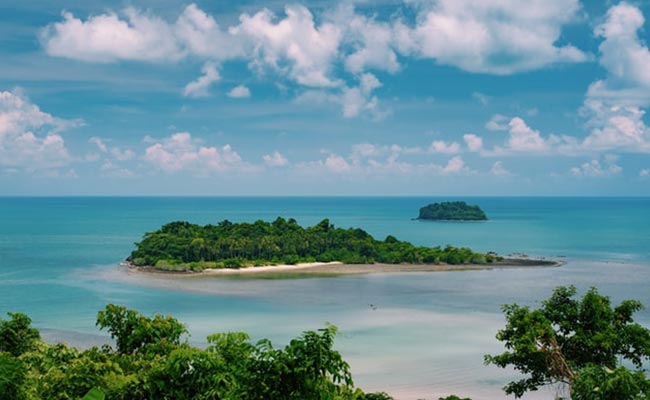
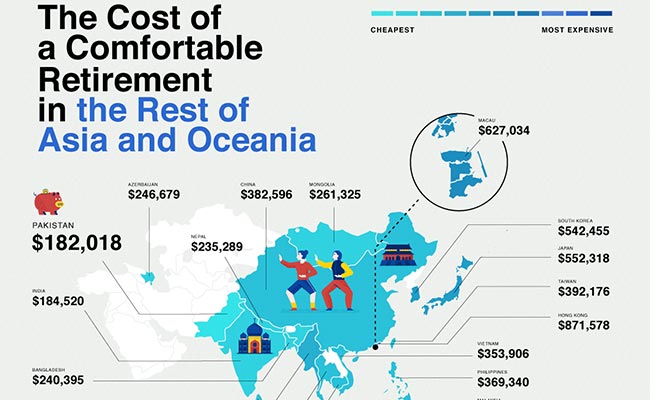

Royascudderr says
May 23, 2023 at 2:05 pm
Paul says
Mar 27, 2023 at 9:15 am
TheThailandLife says
Mar 27, 2023 at 4:45 pm
Darryl Draper says
Mar 01, 2023 at 5:03 am
TheThailandLife says
Mar 10, 2023 at 6:43 pm
Nicole says
Best regards,
Nicole
Nov 21, 2022 at 4:17 pm